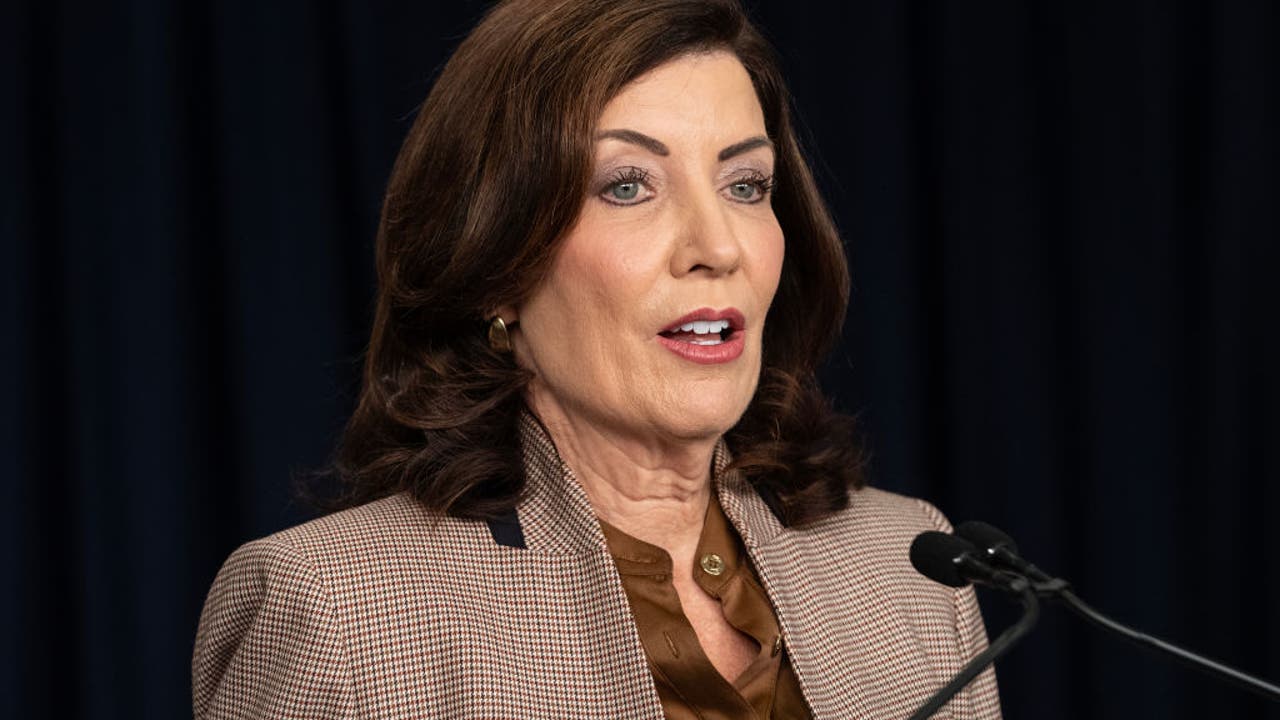- Monday Morning Memo
- Posts
- Happy Birthday Dr. King!
Happy Birthday Dr. King!
State of the State, NYC Cuts, DC Revolt
Good morning from Albany, New York where Governor Hochul delivered her State of the State address last week. The Governor previewed a number of proposals that will be included and expanded upon in Tuesday’s Executive Budget proposal.
We are also watching Iowa tonight, where Republican voters who brave the frigid temperatures will get the first official say of the 2024 campaign season. Latest polls have former President Donald Trump well ahead of his rivals and this caucus is mostly a race for second.
Prior to last week’s speech, Hochul had unveiled plans to address consumer protections and affordability, improve reading proficiency, combat the maternal and infant mortality crisis, and the “NY SWIMS” program to increase swimming proficiency. Her address provided more details on those programs, but also highlighted new initiatives she will be pushing this session.
Last year’s budget was held up for more than a month by a battle over bail reform and Hochul is not going there again. Instead, her public safety agenda includes a task force dedicated to stopping organized retail theft, expanding the definition of hate crimes, and creating a Domestic Violence Strategic Threat Alert Team to more quickly respond to domestic violence cases. All things that most of the Legislature can rally around.
Another big issue last year was housing and Hochul took the time to chastise legislators (and others) for not embracing that plan, but details on this year’s housing proposal were light, especially in contrast to last year’s ambitious, 800,000-unit plan.
Hochul indicated she will be seeking a replacement for 421-a, the tax abatement incentive for developers to build affordable housing but that too failed to win support from legislators last session. Also included were proposals to legalize basement apartments in New York City and an incentive package to convert commercial office space in residential housing.
 | Our Jack O'Donnell gives his take on the Governor’s State of the State speech with Dave Greber and Jordan Norkus of News 4 Buffalo. |
On climate and energy, the centerpiece of Hochul’s proposal is the "Affordable Gas Transition Act” which will eliminate the subsidy for new gas hookups within 100 feet of an existing gas line. Also included in Hochul’s proposal is the “Statewide Solar for All" program that ensures low-income New Yorkers have access to clean energy and are not paying more than 6% of their income on energy bills. She also included a measure to expedite approvals for renewable energy infrastructure projects that will face some blowback and committed to planting 25 million new trees by 2035 to aid decarbonization efforts.
In her State of the State address on Tuesday, New York Gov. Kathy Hochul made expanding school based mental health access a priority. Details:
— Spectrum News 1 BUF (@SPECNews1BUF)
6:00 PM • Jan 11, 2024
Hochul’s public and mental health agenda includes expanding the number of inpatient beds for psychiatric patients as well as specialized housing with residential staff for those with serious mental illness. Partnering with Attorney General Letitia James, Hochul will aim to hold social media companies accountable through the Stop Addictive Feeds Exploitation (SAFE) for Kids Act, a bill that regulates social media algorithms and bans the sale of minors’ online data. The Governor also proposed the Healthcare Safety Net Transformation Program and several other initiatives to improve access to primary care and resiliency of safety net healthcare in parallel to the $7.5 billion 1115 Medicaid Waiver Amendment which was also approved by the Federal Centers for Medicare & Medicaid Services last week.
Perhaps one of the most interesting and promising proposals from the State of the State is the $275 million investment in a statewide artificial intelligence consortium. Dubbed “Empire AI,” the initiative will create a physical center, likely at SUNY Buffalo which is leading the nation in AI, with the computing power necessary for public and private research institutions to be at the front of cutting-edge AI software development. In a statement, Hochul said, “This isn’t just a win for the future of tech — this is a win for the institutions across the state that will benefit from the growth of this technology.”
“This isn’t just a win for the future of tech — this is a win for the institutions across the state that will benefit from the growth of this technology.”
Of course, all of these will need the support of the Legislature if they are to become law and some members wasted no time criticizing the Governor’s proposals, namely on housing. Specifically on housing, Senate Deputy Majority Leader Michael Gianaris offered, “It was very one-sided; it was a developer’s dream and at least one of those proposals puts public money in the pockets of the wealthiest New Yorkers who are the big developers in big real estate.”
Notably, two of the biggest issues facing New York— the migrant crisis and looming budget deficits— were left out of Hochul’s address entirely. Details on a plan to address those issues will be unveiled at the budget presentation scheduled for tomorrow. However, there are already signs of disconnect with her colleagues in the Legislature. Hochul and her administration have been adamant that they will not be raising taxes at any income level, but leadership in the Senate and Assembly are not ruling it out while some rank-and-file members are pushing hard for higher taxes. Speaking specifically on taxes, Senate Majority Leader Andrea Stewart-Cousins offered, “We will be working together collaboratively to find out how to move forward, but everything is on the table.”
 | Which issues will dominate the 2024 Legislative Sessions from D.C. to Albany? Jack lays it out in our annual Legislative Preview. Read it here. |
Harry Bronson - Chair, Labor (Assemblyman Bronson received the OD&A bump after we predicted this in last week’s memo)
Al Stirpe - Chair, Economic Development, Job Creation, Commerce and Industry
Carrie Woerner - Chair, Small Business
Angelo Santabarbara - Chair, Libraries and Education Technology
New York City Mayor Eric Adams has reversed course on planned budget cuts which were slated to target libraries, police, education, and sanitation funding. Adams originally cited the $7 billion budget gap, largely a result of the cost of the migrant crisis, as the reason for the cuts, but has since said his administration’s strong fiscal management alleviates the need for budget cuts. Not everyone is convinced though, including Council Finance Chair Justin Brannan who said, “All of a sudden, the mayor has found money, with irrationally shifting explanations and numbers, cutting into the credibility of his narrative that the city has an insurmountable budget gap that demands overly broad cuts.”
In Washington, D.C., lawmakers are engaged in some fiscal gymnastics of their own ahead of the first of two government shutdown deadlines THIS FRIDAY, January 19th. Senate Majority Leader Chuck Schumer and House Speaker Mike Johnson came to an agreement on a roughly $1.6 trillion top-line spending number, which had to be agreed upon before the two sides could begin negotiations on the substance of the spending bills. The non-defense, discretionary spending came out to $772 billion which is in line with the agreement reached by President Biden and former Speaker Kevin McCarthy.
The revolt from far-right members who want to see much deeper spending cuts began almost immediately, with members of the House Freedom Caucus effectively paralyzing the House Floor by threatening to vote against Republican-backed bills… even those that are unrelated to spending!
That pushback, and statements from his colleagues, led to rumors that Speaker Johnson was going to renege on the top-line number and try to renegotiate a deal. Rep. Marjorie Taylor Greene (R-Ga.) said, “There's going to be a new deal drawn up, and that's what we're in the process of doing” while Rep. Ralph Norman (R-S.C.) offered, “It’s not going to be the current deal.”
Johnson decided to move forward with the top-line number he negotiated, telling reporters on Friday, “Our top-line agreement remains. We are getting our next steps together and we are working toward a robust appropriations process so stay tuned for all of that to develop.” Assuming Johnson does not change his mind again after a few mean tweets from his colleagues, the House plans to pass a two-tiered stopgap that will kick the larger funding discussion until March. The new funding would keep federal agencies running on two different time frames, just like the current stopgap. Funding for some federal agencies would expire March 1, while funding for others would run through March 8. House and Senate leadership are both backing the plan, despite Johnson’s earlier rejection of continued short-term extensions.
Johnson’s problem on this funding deal is the McCarthy trap: Conservatives want more cuts while Moderates want more spending and that played out in the chaos and indecision last week. Most in Congress want a spending deal, but circumventing Republican members and using Democratic votes to avoid a shutdown is what cost former Speaker Kevin McCarthy his job.
Assuming Johnson does not change his mind again after a few mean tweets from his colleagues, the House plans to pass a two-tiered stopgap that will kick the larger funding discussion until March.
When Rep. Chip Roy (R-Texas) was asked if he thinks the same fate will befall Speaker Johnson, he bluntly said, "If they totally botch [the appropriations bills], we get no policy reforms and we're spending at $1.66 trillion, I don't know why we would keep him as Speaker.” There will certainly be more to come on this story as the appropriations process plays out this week.
 | Finally… |

Client in the News
 | UB Jacobs Dean Allison Brashear Leads Med School to New LevelsTwo years ago, Dr. Allison Brashear became the first woman dean of ODA client University at Buffalo’s Jacobs School of Medicine and Biomedical Sciences at a time when only 24% of medical school deans are women. [Read more.] |
ICYMI, our most popular podcasts:  Alec Lewis with new NYS Deputy Comptroller Robin Lois |

Which issue highlighted in Governor Hochul's State of the State address is most important to you? |
Results of the Last Poll
Which issue should be top priority for the Federal Government in 2024?


This Day in History

January 15, 1943: The world's largest office building, the Pentagon is completed to house the U.S. military.
News
Worth a Read
 | The Most Popular Cocktail Drinks in 2024What are people craving from their alcohol mixes? |










